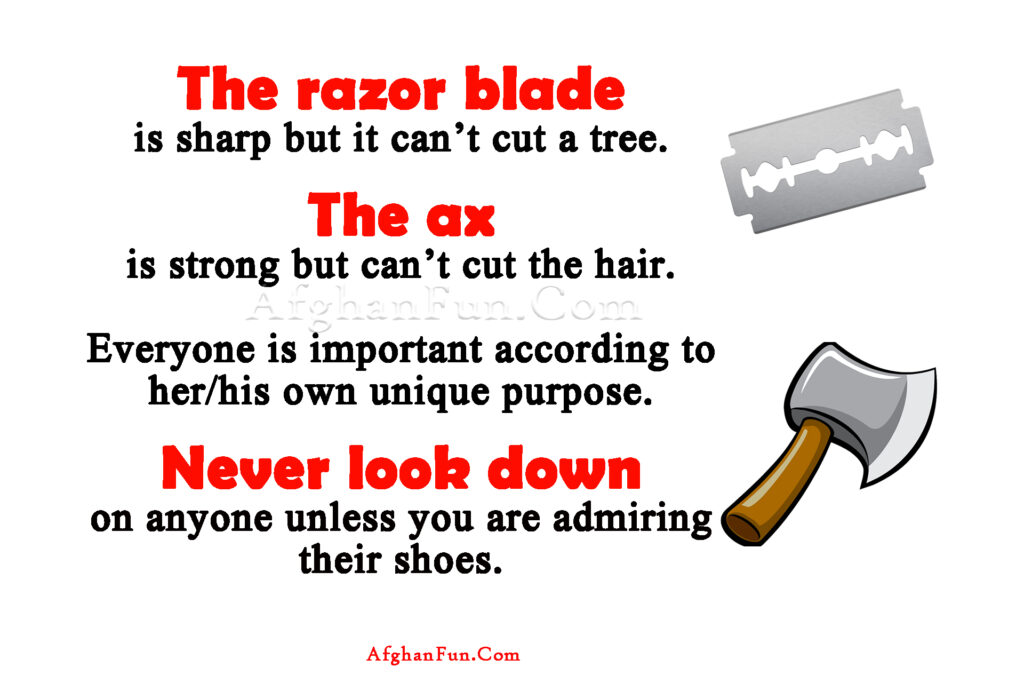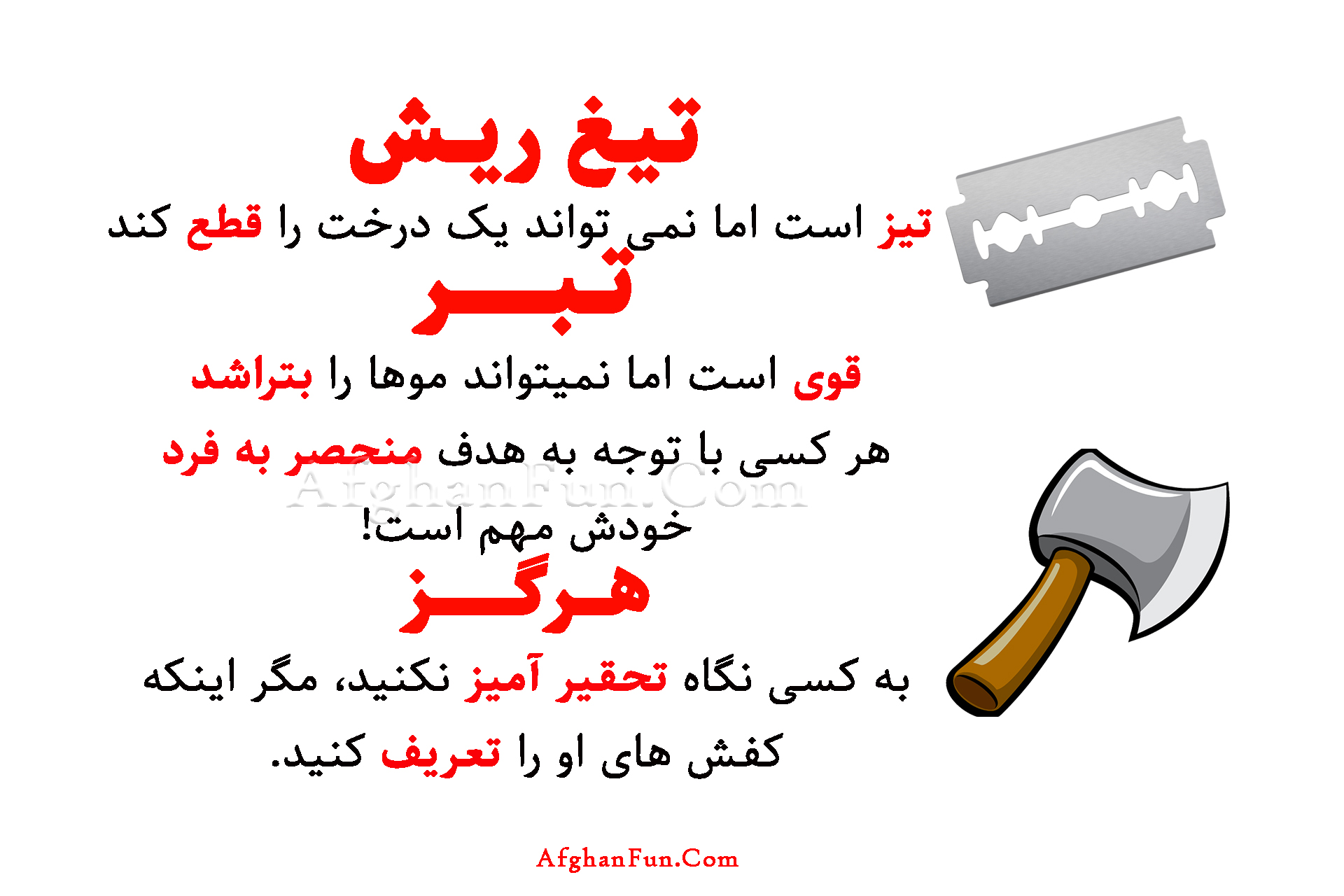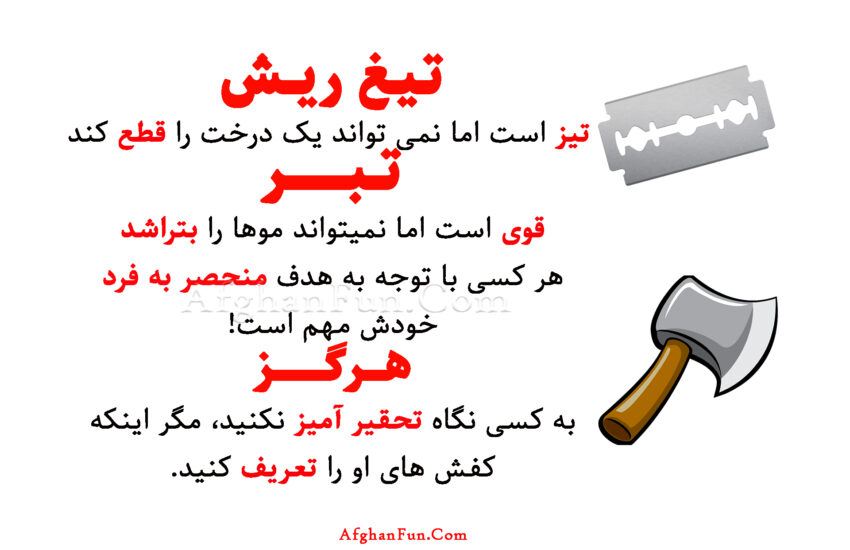
The razor blade is sharp but it can’t cut a tree.
proverb
The axe is strong but can’t cut the hair.
Everyone is important according to her/his own unique purpose.
Never look down on anyone unless you are admiring their shoes.
تیغ ریش تیز است اما نمی تواند درخت را قطع کند.
ضرب المثل
تبر قوی است اما نمی تواند موها را کوتاه کند.
هر کسی با توجه به هدف منحصر به فرد خودش مهم است.
هرگز به کسی نگاه تحقیرآمیز نکنید مگر اینکه کفش های او را تعریف کنید.
Риштарош тез аст, аммо дарахтро бурида наметавонад.
Зарбулмасал
табар мустаҳкам аст, аммо мӯйро бурида наметавонад.
Ҳар кас мувофиқи ҳадафи беназири худ муҳим аст.
Ҳеҷ гоҳ ба касе нигоҳ накунед, агар шумо пойафзолашро тавсиф накунед.
الشفرة حادة لكنها لا تستطيع قطع الشجرة.
ضرب المثل
الفأس قوي لكنه لا يستطيع قطع الشعر.
كل شخص له أهميته وفقًا لغايته الفريدة.
لا تنظر إلى أحد بازدراء إلا إذا كنت تعجب بحذائه.
This proverb presents a series of metaphors that highlight the idea of valuing individual differences, recognizing the importance of everyone in their own right, and avoiding judgment based on superficial assessments.
Breakdown and Analysis:
- “The razor blade is sharp but it can’t cut a tree.”
- Meaning: A razor blade, while it is sharp and effective for precise tasks like shaving or cutting paper, is not suited for tasks that require more force, like cutting down a tree. This suggests that different tools (or individuals) have unique capabilities and limitations. It’s a reminder that something’s effectiveness depends on the context and purpose for which it is intended.
- Broader Message: People, too, have their strengths and weaknesses. Just because someone is highly skilled or efficient in one area doesn’t mean they are suited for all challenges.
- “The axe is strong but can’t cut the hair.”
- Meaning: The axe, being a powerful tool, is designed for tasks that require strength, like chopping wood, but it would be ineffective and inappropriate for cutting hair, which requires precision and delicacy.
- Broader Message: Similarly, individuals may have strong attributes, but these strengths might not always be useful in every context. Strength doesn’t equate to suitability for all tasks, and certain tasks may require subtler, different qualities.
- “Everyone is important according to her/his own unique purpose.”
- Meaning: This emphasizes that every person has a role or purpose, and their value is tied to how they fulfill that unique purpose. No one is insignificant because their worth is not determined by comparison to others, but by the specific contributions they make.
- Broader Message: People should not be judged or diminished based on a narrow or superficial understanding of their abilities. Each person has a value that may not always be immediately obvious, but that is crucial in their own context.
- “Never look down on anyone unless you are admiring their shoes.”
- Meaning: This is a humorous and somewhat ironic twist that conveys a serious message: don’t judge people based on their outward appearance or status. The idea of “admiring their shoes” suggests that the only time you should look down on someone is in the context of appreciating their style or taste, not with disdain or superiority.
- Broader Message: It’s a call for humility and respect. Everyone has something to offer, and unless you’re appreciating someone’s unique qualities (symbolized by “shoes”), you should refrain from judging them negatively.
Overall Message:
The proverb as a whole teaches the value of recognizing people’s unique strengths and roles. It warns against making superficial judgments, and instead encourages an appreciation for the distinct qualities and contributions that every person brings to the table. Just as tools are suited for different tasks, people’s worth is often defined by the context in which they operate, and it’s crucial not to dismiss or look down on others based on narrow or biased criteria. The use of humor in the final line also suggests that while it’s important to acknowledge the individuality of others, we should do so with a sense of humility and lightness.











